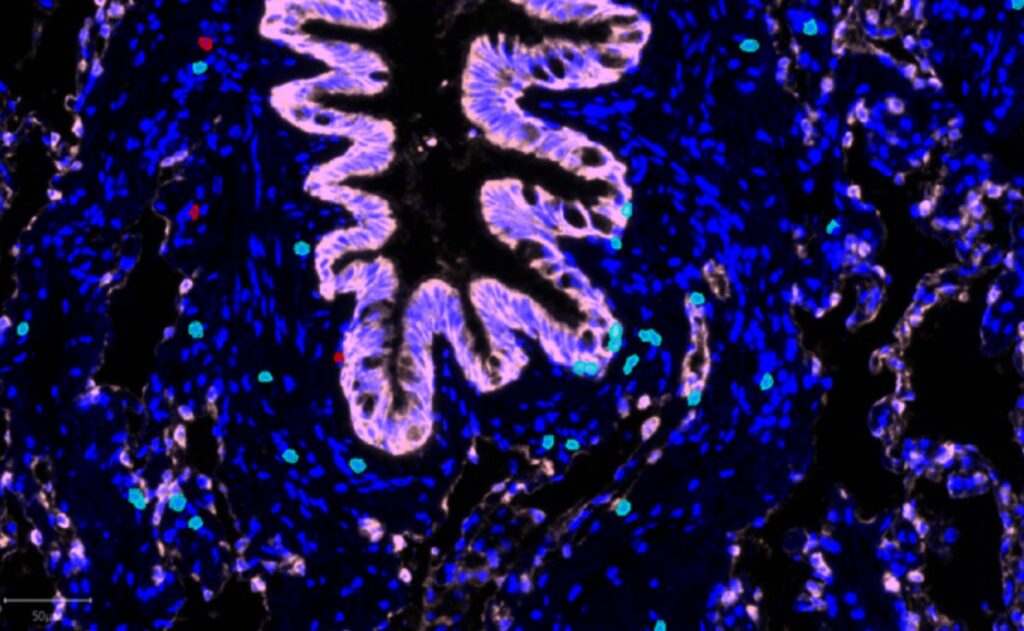A new study conducted by the Walter and Eliza Hall Institute of Medical Research (WEHI) in Melbourne, Australia has shed light on how a patient’s smoking history can alter the course of lung cancer.
The findings suggest that understanding the disparities in the progression of the disease between smokers and non-smokers could lead to the development of innovative treatments.
Non-smokers vs smokers lung cancer
The research team assessed the evolution of lung cancer in smokers versus those who have never smoked and observed significant variations in the body’s response to the disease. These discoveries offer a plausible explanation as to why immunotherapy, a popular treatment for lung cancer, is not always effective.
The study found:
- As compared to those who had never smoked, researchers found that smokers’ lungs had substantially distinct inflammatory conditions.
- Smokers’ lungs have a special subtype of T cells termed TRM that was substantially abundant, causing any tumors that could have developed to change and resist immunotherapy.
- The findings emphasize the need of treating lung cancer patients individually based on their history of smoking.
In Australia, 13,000 people are diagnosed with lung cancer each year; 10% of men and 35% of women have never smoked.
WEHI Associate Professor Marie-Liesse Asselin-Labat and Professor Daniel Gray co-led the recent study, which was published in the journal Cancer Cell.
According to Associate Professor Asselin-Labat, variations in immune responses among smokers and non-smokers could be the reason behind the limited success rate of immunotherapy in treating lung cancer patients, with only 20% of them showing a positive response to the treatment.
“It shows that we need to take a different approach to treating smoker and non-smoker patients with lung cancer,” she added.
“In smokers, we need to make the tumours visible to the immune system for immunotherapy to be effective, whereas in non-smoker patients we need to activate a dormant immune system to enable it to fight the tumour.”

According to Professor Gray, the teams conducting research have made noteworthy observations regarding the surroundings in which tumors develop, as well as the contrasting disease progression between individuals who smoke and those who do not.
“There’s a very different inflammatory environment in the lungs of smokers compared to those who had never smoked,” he said.
“We found a specific subset of T cells, called TRM, that are highly enriched in smokers. In these patients, the TRM apply pressure on the tumour to evade the body’s immune response.
“Immunotherapy is less effective against tumours that acquire this property.”
Finding new lung cancer treatment options
Scientists are currently eager to explore methods to enhance the detectability of cancerous cells by the immune system in individuals with lung cancer who have a history of smoking.
“We are using genomic screening to look for epigenetic silencing that might occur so we can then focus on those targets,” Associate Professor Asselin-Labat added.
“This is the first step in developing precision, tailored therapies for specific patients depending on their smoking history.”
Dr. Clare Weeden, one of the leading researchers, emphasized that lung cancer is not solely a consequence of smoking. She highlighted the significance of comprehending the variances in tumor evolution to enhance the treatment of this disease.
“Our work shows the importance of the environment a tumour develops in. If we can understand the nature of the pre-existing tissue, we can better work out how tumours evolve over time and develop precision therapy for individuals based on their smoking history,” she added.
Source: 10.1016/j.ccell.2023.03.019
Image Credit: Shutterstock and WEHI Researchers
